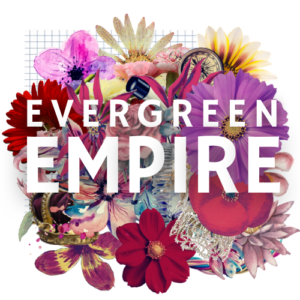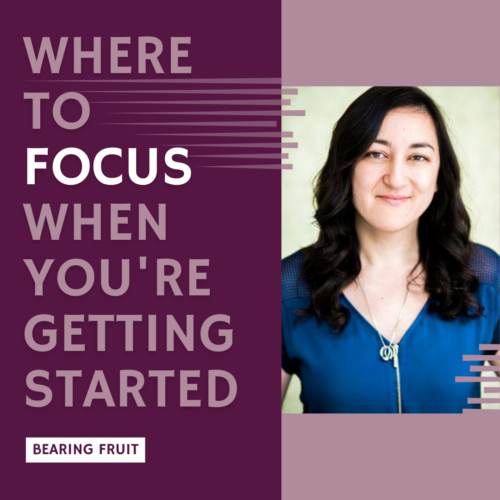Where to Focus When You’re Getting Started
Kevin O’Leary (of Shark Tank fame) was on Erika Kullberg’s (of Erika Taught Me fame) podcast and said mentors are people who give you early lessons learned. Given how true that is, take a seat with me and let Tamara Hamai mentor you for a sec.
Tamara runs Hamai Consulting. It’s an evaluation firm that works primarily with non-profits that focus on family and child well-being. Her website is super cute, take a look. Pitch perfect branding.
Tamara’s been in the business for so long, she’s what we would call “seasoned” and she’s now a mentor.
What I admire about her is how she’s embraced formal organizational roles and shifted herself out of the day-to-day, hands-on work so she can stay focused on company growth and leadership. That’s such a difficult transition for entrepreneurs to make.
But Tamara’s so good at it, she’s even created the space to test a dozen different marketing strategies, one of which resulted in a local news crew in her living room with a microphone and a camera in her face on a hour’s notice to interview her as a subject matter expert for that evening’s newscast.
(Tamara also recorded a guest lesson in Boost & Bloom on understanding your marketing funnel.)
Are some people just born to be great marketers?
Stephanie: Tamara, did you start your business already knowing a lot about marketing?
Tamara: I started the company because my employer at the time showed me that their values were in direct opposition to my values. I started my business so that I could do the work I wanted to do, the way that I felt it should be done. I had no background in business.
Stephanie: This sounds familiar.
Tamara: I put a lot of energy and time into learning how to run a business and how to do really good work with organizations and communities.
I learned about how to do my own bookkeeping and taxes.
How to write a proposal.
What insurance I needed.
Branding and creating business cards and a website.
I read tons of books, went to lots of workshops and classes, and dove deep into how to be a consultant.
When I wasn’t learning, I was serving my clients.
If I could have done anything differently, I would entirely change my focus from learning and client work to these two things: Being visible and building an alliance.
Stephanie: Oh this is some juicy hindsight right here. Say more about being visible.
Tamara: Marketing and selling are your most important activities every day as a start-up.
Start being visible from day 1. I spent years working on things inside my business, but hardly anybody (including potential clients) knew that I existed.
You need to be marketing and getting out in front of people. Start building relationships even when you don’t know who you’re serving or what you’re selling. As soon as you think you have something to sell, see if anybody will buy it.
Don’t worry about anything else until you have a minimum viable business model and you have validated it through sales.
Stephanie: Sometimes it can feel like visibility means … doing everything. So what would you not waste a minute on while you focus on visibility?
Tamara: When it comes to visibility, I worked so much harder than I needed to for a lot of years. I’m still not as visible as I should be. I wouldn’t waste any time creating visibility that requires learning lots of new things or going far out of what I already know and enjoy.
I hate social media (I have ethical issues with the data-as-an-asset business model) and a lot of other marketing activities require a lot of learning time for me.
I’d focus on being visible in ways that are easy and enjoyable. For me, that would be attending events, gathering people, and talking to people one-on-one. I also love teaching, so doing workshops at conferences would be on this list for me, too.
Networking, attending events, reaching out to talk to people over coffee/wine/whiskey, and doing workshops at conferences would have been the best way for me to spend 80% of my time in my start-up years. Thus, creating a strong, positive contact list and keeping in touch with them regularly.
Hi Reader.
Stephanie-as-the-writer popping in here to ask you to reflect on what Tamara just said in this part of the interview. 1. Figure out what marketing strategies feel natural to you. (They don’t have to be the same ones as Tamara.) And write to me to tell me what those are.
And 2. Get a contact list going and stay in touch with these people. I do that through newsletters (HI!) but you have options. The point is to set up a mechanism to keep in touch before you get out there wine-ing it up with folks so that you have an immediate way to stay connected.
Back to the interview.
Stephanie: So what about building an alliance? I see some new entrepreneurs who seem to have networking baked into their DNA and others who struggle with it more, like I do. How did that come about for you?
Tamara: Growing up, I had learned that success came from independent hard work and bootstrapping. But the truth is that no success that I’ve had in life was actually earned on my own, even though I worked hard for everything. None of us can do it alone. That’s where the alliance comes in.
The biggest decision you make is what you will and will not do with your time, energy, and resources. You’ll have better ideas and make better decisions when you’re working with other people.
The alliance that I have now that I wish that I had then: People who are my biggest supporters, who are invested in my and each other’s success, and are also unafraid of challenging me or showing me what I’m missing. A group where everyone can be honest, have their voice heard and valued, and have generative friction. We co-create ideas, solutions, and decisions in a safe space. They inspire me to be bold with my vision and hold me accountable to what I say I will do.
Stephanie: Now that you have the experience to speak from, what do you look for in an alliance?
Tamara: Who is in your alliance matters. The best members to have in your alliance include:
- People who have a diverse set of roles, perspectives, lived experience, and expertise.
- Mentors who have already achieved the kinds of big things you want to achieve, in ways that you admire.
- Peers one step behind, at the same level, and one step ahead of you.
- Someone who you know deeply understands you and your values (like someone who has known you a really long time).
- People with expertise/professional knowledge in critical areas (a lawyer, for example)
Once you have the people, you need to establish a safe and meaningful process for discussing issues and making decisions together.
Stephanie: And who would you avoid putting in your alliance? What mistakes do rookie alliance-builders make?
Tamara: Don’t just ask your friends or the people you already know for advice. You need people who will challenge you, but from a place of compassion. So, don’t waste time talking to people who are your friends who will support anything you do or anyone who thinks it’s ever helpful to “play devil’s advocate.”
Steer clear of people who tell you to do it their way, or that there is only one way to do things.
Don’t try to build your business alone while you sit in your makeshift office-dining room.
Don’t hire the first marketing consultant you find (I’m still getting over this one…)
Stephanie: I need to hear this story over wine.
Tamara: …or the first coach who says they can help you.
Most people know, are friends with, or are connected to people who are similar to them in terms of perspective, attitudes, and life experiences.
I’ve learned more by having mentors, coaches, advisors, friends, and colleagues in my alliance that are different from me and different from each other.
The people who are going to be your strongest supports are willing to challenge you to think differently while embracing the need to test and adapt ideas through your values for the business that you want to build.
Hi Reader.
Stephanie-as-the-writer back again to ask you to think through who is in your alliance. If it’s just your closest besties, Tamara’s telling you that won’t be the best way to grow.
Your alliance should make you feel challenged a bit. Slightly uncomfortable because your ideas are being pushed. Perhaps even pissed off from time to time.
Your alliance should also make you feel fully supported. Inspired. Buoyed through the different phases of your business, even when you become as seasoned as Tamara.
So, who is in your alliance right now? Count me in. And who do you need to add? Send me your list.


1 Comments